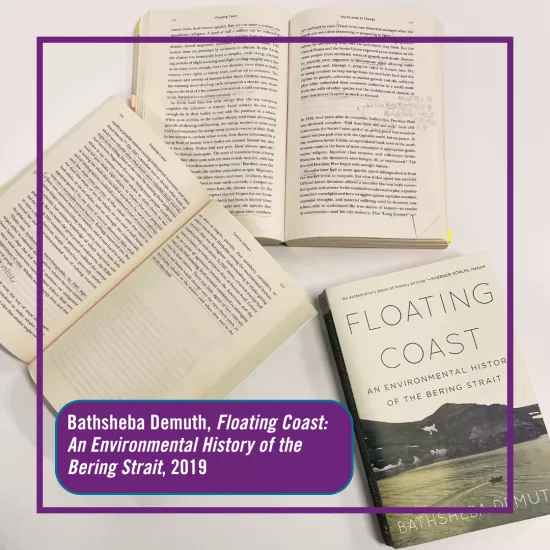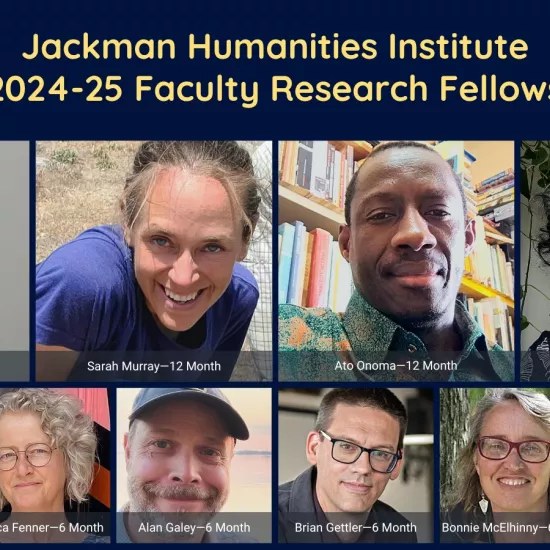Interview with Historical Studies Student, Tatiana Rios

1. Tell me about some of the work you’ve done as a Work-Study student.
My Work-Study role began at the end of my second year when I was hired as an assistant editor for the website Energy Humanities, a platform offering scholarly articles on climate, energy, and culture. I worked directly with the Editor and UTM professor Caleb Wellum on copy-editing and publishing opinion pieces, reviews, author’s notes.
I also got to work on the redesign of the website, collaborating with a web designer to streamline the site and revamp the reader experience. As part of that process, I took on the task of managing the site’s social media presence and summarizing articles for Instagram. The role evolved quite quickly and the next project ahead of me was helping with the logistics of the 2024 Petrocultures conference at the University of Southern California.
2. What was your role for the Petrocultures conference? What did you learn from your experience with the conference and with Energy Humanities?
My involvement in the conference began with helping keep track of registrations and organizing paper submissions. When an opportunity opened to travel to Los Angeles to attend and assist on site, I took it! Once there, I handled last-minute panel changes, directed attendees to where they needed to be, and even chaired a panel for the first time.
While many people say that networking is the number one goal of conferences, I learned that it’s not enough to just be there. It’s important to engage actively with the conversations taking place around you.
From my work with Energy Humanities, I learned the importance of consistency—in editing style, formatting, workflow, and communication—especially in a remote job. I tried to emulate how Professor Wellum provided feedback and communicated with authors during the editing process while I published each article on Instagram. Ultimately, it came down to capturing interest, conveying substance, and expressing new and emerging ideas to a broad audience, which is crucial in the age of AI. I think that’s what made this project so successful.
3. What has been your favourite part of this experience?
My favourite part of being a Research Assistant for Energy Humanities is knowing that my work is seen and valued. From copy-editing to sourcing materials and managing social media, each task feels like it contributes to the success of our authors’ work. I love seeing the behind-the-scenes process that goes into each piece, which readers often don’t get to see. It’s also incredibly rewarding to be part of a team that values my contributions just as much as I value the mentorship and collaboration with established professors, authors, and team members.
Attending the Petrocultures conference was also a wonderful experience. It gave me so much inspiration for my own research and felt like a preview of what my graduate studies could look like. Everyone was there to share their ideas or preview their upcoming work, while attendees provided feedback and probed their findings to help fine-tune their craft. It was very cool to witness and truly felt like a culmination of months of hard work.
4. What has been the most challenging part of this role?
Two challenges arose for me. The first, and most challenging part, was learning to prioritize my time. Balancing work and school initially felt like a juggling act but turned out to be quite complementary. The skills I developed in time management, with the help of my editor and our workflow schedule, really helped me stay grounded and present in the work I was doing, both for Energy Humanities and in my classes. The second challenge was learning how to translate scholarship to social media. I had to present Energy Humanities in an engaging and accessible way while adapting to some skepticism regarding climate and sustainability, and even our motivations. It required thoughtful navigation and taking feedback from our engagement and responses.
5. How has your History degree helped you in this role?
My background in history has provided me with a strong foundation for engaging with the articles I edit and the content I create. Historical context is crucial at this level, and familiarity with various authors, theoretical frameworks, and historical events elevates the work beyond a proofreading gig. As I grew into this role, I began putting more trust in my knowledge of the topics or referenced texts. Even the smaller tasks, like knowing when to fact-check, finding original sources and quotes, formatting citations, or selecting the right images, become easier once you lean into the historical side of it.
It also prepared me for the workload. Knowing how and when to read deeply allows me to manage the busy work effectively and directly contributed to the success of my final year.
6. Do you have any advice for other UTM students considering a Work Study/Research Assistant position?
I’ve always appreciated an itemized list, so I’ll leave one here for anyone considering a work study position:
Take your time. In school, there’s often a tendency to hastily submit assignments or skim through our final papers. This role has taught me the value of taking my time to refine my writing, carefully develop my arguments, and express my ideas clearly. I know it’s cliché but it’s important to appreciate the process rather than fixating on the end result
Don’t be intimidated by the job description. Feeling nervous about working with professors or unsure about the title “research assistant” is normal. When I first heard about the Work-Study program, I remember thinking, “I’m not an editor,” and I questioned what I had to offer to such established writers. But I knew that I’m an ideas-oriented person, that I’m always problem-solving and that I excel in creative projects. So, instead of focusing on what you think you can’t do, leverage what you love to do and take the opportunity to learn new things you didn’t know you could do.
Prepare yourself to work with a team. The title “research assistant” might sound like you’re helping on a secondary level. While I can’t speak for every department, just know that you are not working alone. Even if you’re not working directly with a team, your supervisors are there to guide and support you. Embrace the challenges and take the opportunity to reach out and learn from them—it’s all part of the process and what makes this experience truly impactful.



